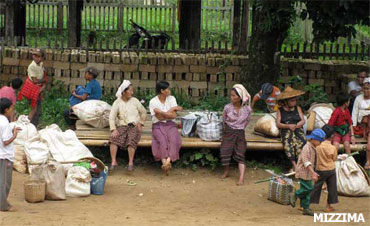Burmese government troops are still committing a litany of human rights abuses in Shan State, according to Shan Women’s Action Network (SWAN), a Thailand-based NGO which recently returned from a fact-finding mission to Burma.

Speaking at a press conference in Chiang Mai on Wednesday, a SWAN spokesperson said that villagers they had spoken to complained of sexual violence against women, beatings, arbitrary detention and the forceful seizure of farmlands by the Burmese army.
“Despite the ceasefire, war is still raging in the region,” SWAN’s Ying Harn Fah told Mizzima. “Many people still have to flee from their homes to the jungle frequently to avoid the conflict. They have to abandon their farms.
“Villagers who are suspected of having rebel sympathies are beaten up and arrested, sometimes for months at a time. Others have had their lands seized by the government forces,” she said.
In a statement, SWAN accused the Burmese government of not seeking a lasting peace, but instead focusing on foreign investments.
The women’s NGO urged the Burmese government to withdraw their troops from Shan State and engage in political dialogue aimed at achieving a genuine peace.
Representatives of SWAN conducted their first official trip to Burma from the end of November to December 18. They said they visited Taunggyi, Naungcho, Kyaukme, Thibaw, Lashio, Theinni, Kutkai, Namkham, Muse and Kengtung, meeting and taking testimonies from Shan people from a variety of social circles.
Ying Harn Fah said they were told of four cases of sexual assault in Monghsu by soldiers of the Burmese army.
Previously there was only one battalion on average in each of the 55 townships in Shan State, she said. However, now there are some 180 battalions, so civilians are increasingly worried about human rights violations.
Another worrisome issue for the residents of Thibaw Township is the laying of an oil and gas pipeline just five miles from their village. Many locals fear explosions and are demanding that the project be suspended, Ying Harn Fah said.
“Even the electric poles have to be replaced every five or six months because of rust,” she said. “Who will take responsibility for a gas pipeline explosion? Some of the pipelines are not even in proper alignment. This gas pipeline project is too dangerous.”
She said that many Shan people had raised this issue with their MPs but nothing has been done.
The oil and gas pipeline project is being conducted by China National Petroleum Corporation, and when completed will run from Ramree Island in Rakhine State via Maymyo in Mandalay Region, through Thibaw, Naungcho, Muse, Namtu, Kyaukme and Namkham in Shan State, and ending in China’s southwestern Yunnan Province.
A Shan environmental group previously told Mizzima that 15,000 acres of farmland had been seized to make way for the pipeline in Namkham Township alone.
Ying Harn Fha said that they planned to submit a case to the central government through their MPs in Shan State calling for a suspension of the pipeline after consulting local Shan people, Shan political parties, armed groups and civil society groups.
The SWAN spokesperson said that during their visit to Burma, the NGO members were constantly monitored and questioned by Burma’s intelligence agencies.
With regard to the “Building Confidence for Peace” forum which was held in Rangoon from November 26 to 28, she said that such a meeting of Shan political parties, Shan armed groups, Shan cultural and literature associations and other groups boded well for the Shan people and would help create a sense of unity in the war-torn region.


